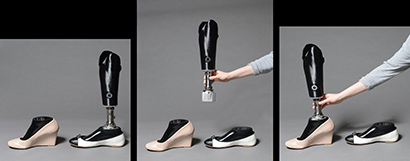Office of Research & Development |
 |
Office of Research & Development |
 |
October 7, 2021

Everyone knows women’s anatomy is different than men’s. What many have given little thought to, however, is that prosthetic components for amputees, including legs and feet, must accommodate differences between the sexes, including differences in fashion. In 2021, VA prosthetists developed a method to allow women Veterans with lower-limb amputations to wear whatever type of shoes they want, including heels, whenever they want to.
Women generally require smaller prosthetic feet than men because of smaller bone structure and muscle mass. However, most commercially available prosthetic feet are not gender-specific and are designed more with males in mind.
In 2008, VA Research introduced the Amputation System of Care (ASoC) to ensure the rehabilitation goals and health care needs of Veterans with amputation are addressed. ASoC has completed and implemented numerous initiatives related to women Veterans, including conducting panel discussions, publishing scientific journal articles to educate providers on women’s unique needs, and providing training to VA health care providers in this area.
As part of this effort, VA prosthetists have developed specific prosthetic items for women. Most recently, VA’s Minneapolis Adaptive Design and Engineering (MADE) program is collaborating with industry to create a prosthetic ankle that can interface with feet created with a 3D printer, allowing women Veterans with amputations to choose nearly any shoe they want, including high heels, to wear with their prostheses.
Here’s how it works: Veterans bring their shoes to VA prosthetic clinics. The shoes are measured by a prosthetist and the measurements are sent to a 3D printer. A modular prosthetic ankle system developed by MADE snaps into the newly printed foot, and the Veterans can now wear the footwear of their choice.
MADE’s mission is to develop and disseminate adaptive technologies to help Veterans maximize their function and participation in meaningful activities throughout their lifespan. In 2021, the organization entered into a cooperative research and development agreement with UNYQ, a company based in San Francisco, for 3D printed prosthetics.
The object of the collaboration is to introduce personalized prosthetic and orthotic devices that address the specific needs of Veterans with amputations, using technology including 3D printing, generative design, and app development. UNYQ is helping VA develop a strategy to bring the new prosthetic ankle and 3D-printed feet to market, making them available to everyone who would benefit from them, including Veterans.
Principal investigator: Dr. Andrew Hansen, VA Minneapolis Adaptive Design and Engineering
Selected publications:
Minneapolis Adaptive Design & Engineering Program website
UNYQ to Develop 3D-printed prostheses with VA, UNYQ press release, Feb. 17, 2021
A review of unique considerations for female veterans with amputation. Randolph BJ, Nelson LM, Highsmith MJ. Mil Med. 2016 Nov;181(S4):66-68.